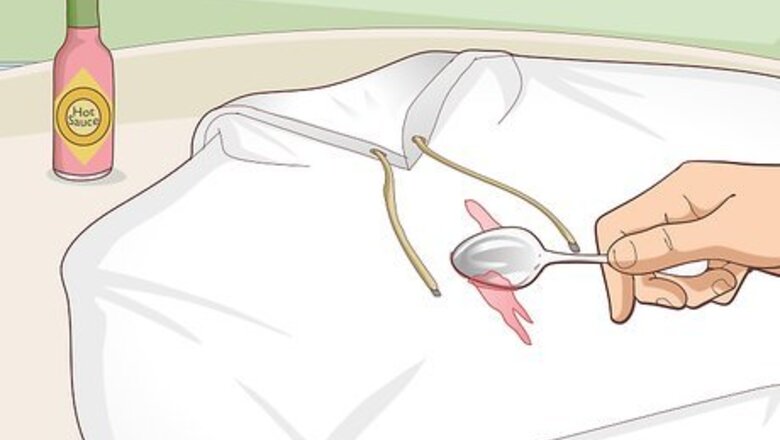
views
Cleaning Hot Sauce Stains out of Clothing
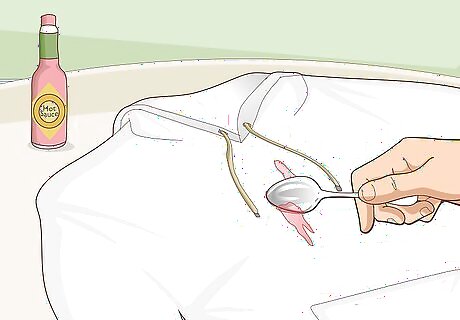
Scrape off any excess hot sauce as soon as possible. Try using a spoon, butter knife, credit card, or even a paper towel to rub away as much of the hot sauce as you can. The stain will be easiest to treat if you get to it right away, but even if it dries before you notice it, start treating it as soon as you're able to. The more hot sauce that's present, the more likely the stain will be to spread once you start trying to clean it, which is why scraping off the excess is important. Warning: If your garment is dry-clean only, scrape off the excess, then take it to a professional to have it cleaned.
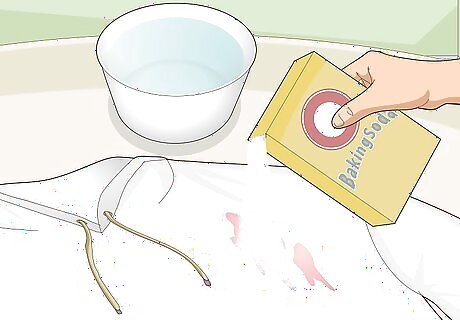
Coat large, fresh stains with baking powder, then rinse with cool water. To absorb some of the oil from the stain, sprinkle a generous layer of baking powder over the entire surface of the stain. Leave it in place for at least 15 minutes, then turn the garment inside-out and rinse the back of the stain with cold running water. While this isn't likely to take the stain out of the garment, it can make it easier to clean, since it helps remove some of the oil. You can also use cornstarch if you don't have any baking powder on hand. Rinsing the stain from the back will help flush the oil out of the fabric without spreading the stain.
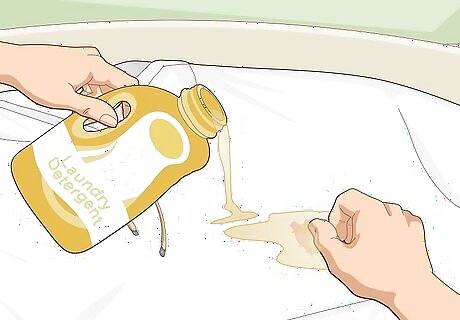
Rub liquid laundry detergent out of the stain and let it sit for 3-5 minutes. Pour a small amount of liquid laundry detergent onto the garment, then gently rub the detergent onto the surface of the stain. Wait for about 3-5 minutes, then turn the garment inside-out and rinse the spot under cold running water. When you're finished, launder the garment as usual. Do not use bar soap or powder detergent. You'll likely have to scrub to get these to cover the spot, which could set the stain deeper into the fabric. This is especially useful for cleaning a stain that's dried, although it will work on fresh hot sauce stains, as well.
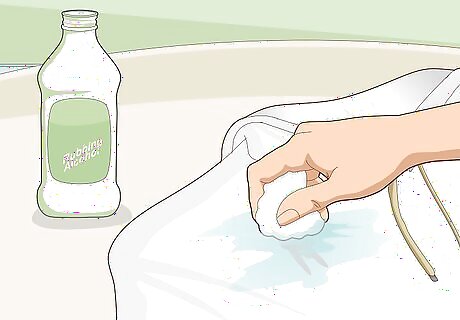
Clean the spot with rubbing alcohol for a quick fix. If you want to lighten a hot sauce stain quickly, blot the area with rubbing alcohol and clean paper towels. Continue blotting until most of the stain is gone. Your garment should dry quickly once you're finished! You can also use hand sanitizer or white vinegar if you don't have rubbing alcohol available. Just make sure the hand sanitizer is clear and fragrance-free so it won't stain your clothes.
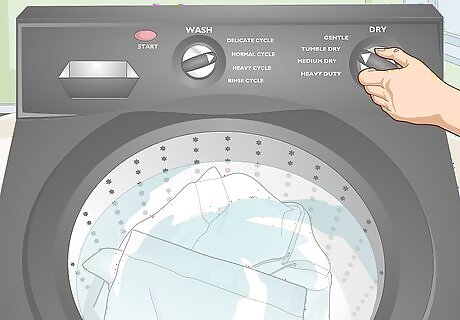
Wash the garment as usual once you lighten the stain. No matter which stain removal method you use, once you get the majority of the hot sauce out of the garment, run the clothing through your washing machine on a cool cycle. Examine the garment closely once you finish washing it. If the hot sauce is completely gone, put the clothing in the dryer or hang it up to dry. If there's still a faint stain, continue treating the garment until it's gone. Washing the garment in cool water will prevent the stain from setting into the fabric if it isn't completely gone. If you prefer, you can hand wash the garment instead. Drying the clothing can set in the stain, which is why it's important to check before you put it in the dryer.
Getting the Stain out of Carpet or Upholstery
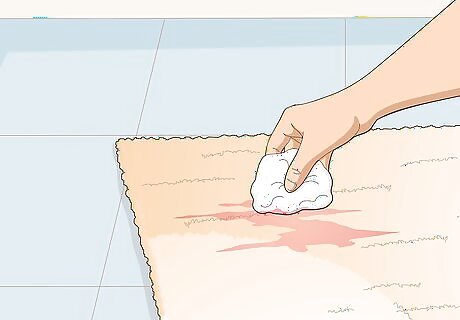
Blot up or scrape off any excess hot sauce. If you spilled hot sauce in your carpet or splattered it on your couch, try to remove as much of the stain as you can. To do that, blot the area with a clean, dry cloth if the stain is fresh, or scrape off any dried hot sauce with a butter knife, spoon, or paper towel. This will help keep the stain from getting larger when you add your cleaner.
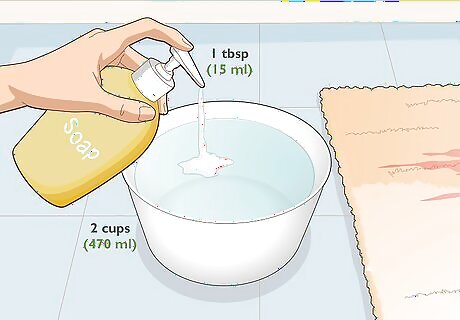
Mix 2 cups (470 mL) of water and 1 US tbsp (15 mL) of liquid soap. In a small bowl or shallow container, mix cool, clean water with a small amount of liquid dish soap. Then, stir the mixture gently with a spoon or your hand so it's thoroughly combined. Tip: For extra cleaning power, add 1 US tbsp (15 mL) of white vinegar to the mixture. If you use warm water, the stain could set deeper into the fabric.
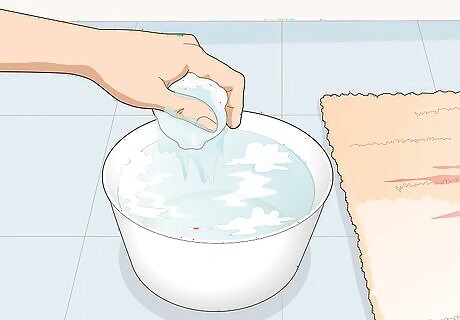
Dampen a white cloth with the mixture and wring out the excess. Take a clean, white cloth and dip it in the soapy water you just mixed up. Then, wring out the cloth until it stops dripping. In general, when you're cleaning carpet or upholstery, it's best to use as little water as possible to avoid spreading the stain or leaving water spots. Using a white cloth will ensure that you don't transfer any dye from the towel to the upholstery.
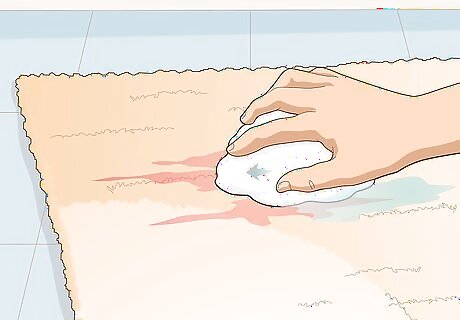
Dab the stain with the wet cloth from the outside in. Blot the outside edges of the stain first, working in toward the center. Continue patting the stain, switching to a clean portion of the cloth as needed until the spot is gone. You can also dip the cloth in the soapy water and wring it out again if it starts to dry out. To keep up with what side of the cloth you've already used, try folding it into quarters before you start. Work on the first side, then flip the cloth over and use the second side once that's dirty. Then, turn the last fold inside-out and you'll have 2 clean sections of the cloth to work with.
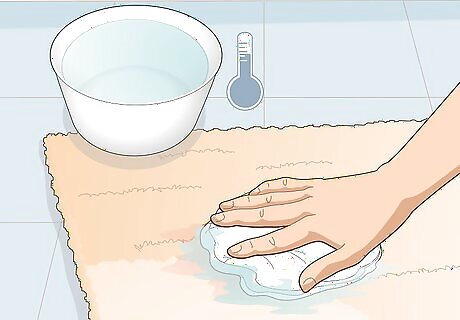
Blot the area with cold water and a clean cloth to remove the soap. Once you've gotten the stain out of the carpet or upholstery, pour out your soapy water and replace it with clean, cold water. Dip a clean, white cloth in the cold water and wring it out, then blot away any soapy residue that's left behind. Over time, the soap will lead to a large dirty-looking stain if you don't remove it.
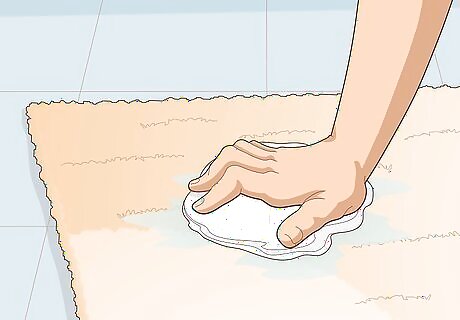
Dry the area with a clean cloth. After you blot up the soap, take a clean, dry towel and pat the area dry, absorbing as much of the water as possible. If any dampness remains, let the spot air dry overnight. The cloth you use to dry the area should be white as well. Colored towels may leave behind residual dye that could stain your carpet or upholstery.
Treating Hard Surfaces
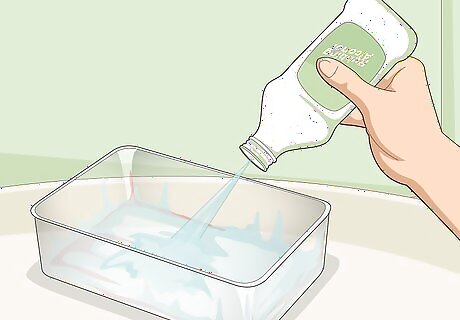
Soak plastic containers in rubbing alcohol to remove hot sauce stains. If the stains are on the inside of a container, fill the container with enough rubbing alcohol to completely cover the stained area. If the stain is on the outside, fill a larger container with the rubbing alcohol, then submerge the smaller container in the alcohol. Let it sit overnight, then rinse thoroughly with cold water. You can also use hand sanitizer, bleach that's diluted 1:10 with water, or white vinegar. Tip: If you microwaved a plastic dish that contained hot sauce, the stain is baked in, and unfortunately, there's no way to remove it.
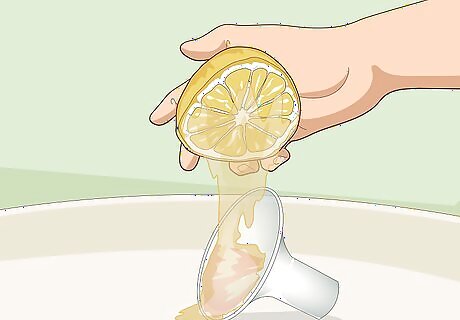
Cover small plastic items with lemon juice and put them in the sun. To bleach hot sauce stains off of dishes, toys, or other small items, rub lemon juice over the stain. Then, put it outside on a sunny day for 1-2 hours. The stain should be noticeably lighter, and it may even disappear entirely. Lemon juice alone may lighten the stain, although it's more effective in combination with the sunlight.
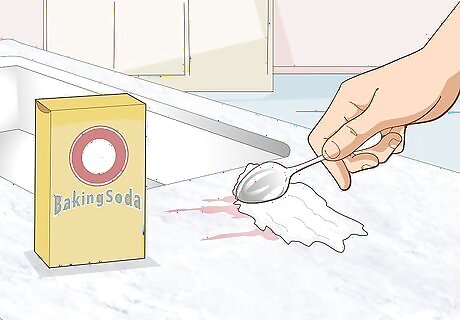
Apply baking soda paste to remove hot sauce from countertops. If you spilled hot sauce on your counter and it stained, try mixing baking soda with just enough water to make a thick, grainy paste. Spread the paste over the entire surface of the stain and let it sit for at least 30 minutes, although for stubborn stains, you may want to leave the paste on overnight. Then, rinse the area with cool water. You can also try using the baking soda paste as a scrub to clean hot sauce stains. A paste made of denture tablets or effervescent antacids may be effective, as well. Warning: This gentle cleaner is safe to use on most surfaces. However, test the paste in an inconspicuous area to ensure it won't change the color of your countertop.
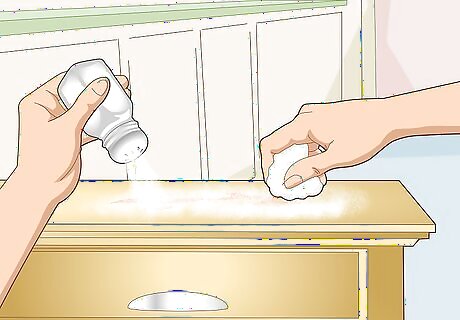
Use table salt to scrub stains from smooth surfaces. Pour salt over the surface of the stain. Then, take a damp cloth and rub it into the salt in a circular motion. The abrasiveness of the salt scrub should help work the stain out of the surface. For instance, you can use this to scrub countertops, tabletops, or dishes with stubborn hot sauce stains. Because this scrub is abrasive, avoid using it on any surface that would be easily scratched, like marble or lacquered surfaces.




















Comments
0 comment